10 start with W start with W

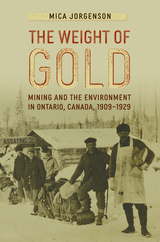
Mining in North America has long been criticized for its impact on the natural environment. Mica Jorgenson’s The Weight of Gold explores the history of Ontario, Canada’s rise to prominence in the gold mining industry, while detailing a series of environmental crises related to extraction activities. In Ontario in 1909, the discovery of exceptionally rich hard rock gold deposits in the Abitibi region in the north precipitated industrial development modeled on precedents in Australia, South Africa, and the United States. By the late 1920s, Ontario’s mines had reached their maturity, and in 1928, Minister of Mines Charles McRae called Canada “the mineral treasure house to [the] world.”
Mining companies increasingly depended upon their ability to redistribute the burdens of mining onto surrounding communities—a strategy they continue to use today—both at home and abroad. Jorgenson connects Canadian gold mining to its international context, revealing that Ontario’s gold mines informed extractive knowledge which would go on to shape Canada’s mining industry over the next century.

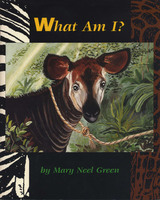
In the dense, shady rain forest, it's easy for a little guy to get lost from his mother. When a young okapi wanders away from his mom, he discovers the world of people and learns that he is a very special animal, different from all the rest. But still he misses his mother and their home in the forest. How can he get back?
This heartwarming tale with a happy ending introduces children from ages three to eight to the okapi, a graceful, elusive animal native to the Ituri Forest of Congo-Zaire. Based on the true story of an okapi calf that escaped from captivity, it is sure to delight young animal lovers, while teaching them basic facts about the family life of the okapi. A brief afterword provides more information for parents and older children.
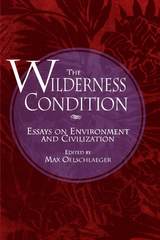
This book aims to introduce to a larger audience issues that are too often limited to scholarly circles. A thought-provoking collection of essays by some of the environmental movement's preeminent thinkers, The Wilderness Condition explores the dynamic tension between wild nature and civilization, offering insights into why the relationship has become adversarial and suggesting creative means for reconciliation. Contributors include Paul Shepard, Curt Meine, Max Oelschlaeger, and George Sessions.
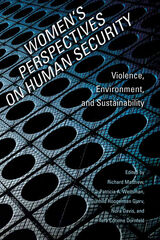
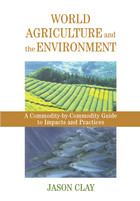
World Agriculture and the Environment presents a unique assessment of agricultural commodity production and the environmental problems it causes, along with prescriptions for increasing efficiency and reducing damage to natural systems. Drawing on his extensive travel and research in agricultural regions around the world, and employing statistics from a range of authoritative sources including the United Nations Food and Agriculture Organization, the author examines twenty of the world’s major crops, including beef, coffee, corn, rice, rubber, shrimp, sorghum, tea, and tobacco. For each crop, he offers comparative information including:
• main producing and consuming countries
• main types of production
• market trend information and market chain analyses
• major environmental impacts
• management strategies and best practices
• key contacts and references
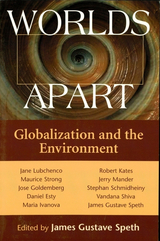
Worlds Apart presents a cohesive set of essays by leading thinkers on the subject of globalization, offering a thoughtful overview of the major environmental issues related to globalization in a clear, reasoned style. Framed by Gus Speth’s introduction and conclusion, essays range from Jane Lubchenco’s discussion of the scientific indicators of global environmental change to Robert Kates’ examination of the prospect that our growing global interconnectedness could lead a transition to a more sustainable world to Vandana Shiva’s impassioned plea for a new “living democracy” that counters the degrading, dehumanizing tendencies of the global economy. Other contributors include Maurice Strong on the Rio Earth Summit and the future course of environmentalism, José Goldemberg on energy, Jerry Mander on the inherent destructiveness of the global economic system, Stephan Schmidheiny on the forestry industry, and Daniel Esty and Maria Ivanova on global environmental governance.
Edited by one of the world’s leading experts on international environmental issues, the book brings together the most respected thinkers and actors on the world stage to offer a compelling set of perspectives and a solid introduction to the social and environmental dimensions of globalization.
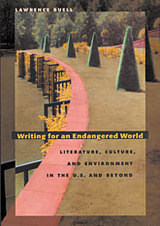
The environmental imagination does not stop short at the edge of the woods. Nor should our understanding of it, as Lawrence Buell makes powerfully clear in his new book that aims to reshape the field of literature and environmental studies. Emphasizing the influence of the physical environment on individual and collective perception, his book thus provides the theoretical underpinnings for an ecocriticism now reaching full power, and does so in remarkably clear and concrete ways.
Writing for an Endangered World offers a conception of the physical environment--whether built or natural--as simultaneously found and constructed, and treats imaginative representations of it as acts of both discovery and invention. A number of the chapters develop this idea through parallel studies of figures identified with either "natural" or urban settings: John Muir and Jane Addams; Aldo Leopold and William Faulkner; Robinson Jeffers and Theodore Dreiser; Wendell Berry and Gwendolyn Brooks. Focusing on nineteenth- and twentieth-century writers, but ranging freely across national borders, his book reimagines city and country as a single complex landscape.
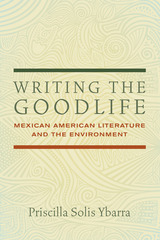
Goodlife writing has existed for at least the past century, Ybarra contends, but Chicana/o literary history’s emphasis on justice and civil rights eclipsed this tradition and hidden it from the general public’s view. Likewise, in ecocriticism, the voices of people of color most often appear in deliberations about environmental justice. The quiet power of goodlife writing certainly challenges injustice, to be sure, but it also brings to light the decolonial environmentalism heretofore obscured in both Chicana/o literary history and environmental literary studies.
Ybarra’s book takes on two of today’s most discussed topics—the worsening environmental crisis and the rising Latino population in the United States—and puts them in literary-historical context from the U.S.-Mexico War up to today’s controversial policies regarding climate change, immigration, and ethnic studies. This book uncovers 150 years’ worth of Mexican American and Chicana/o knowledge and practices that inspire hope in the face of some of today’s biggest challenges.
READERS
Browse our collection.
PUBLISHERS
See BiblioVault's publisher services.
STUDENT SERVICES
Files for college accessibility offices.
UChicago Accessibility Resources
home | accessibility | search | about | contact us
BiblioVault ® 2001 - 2024
The University of Chicago Press









